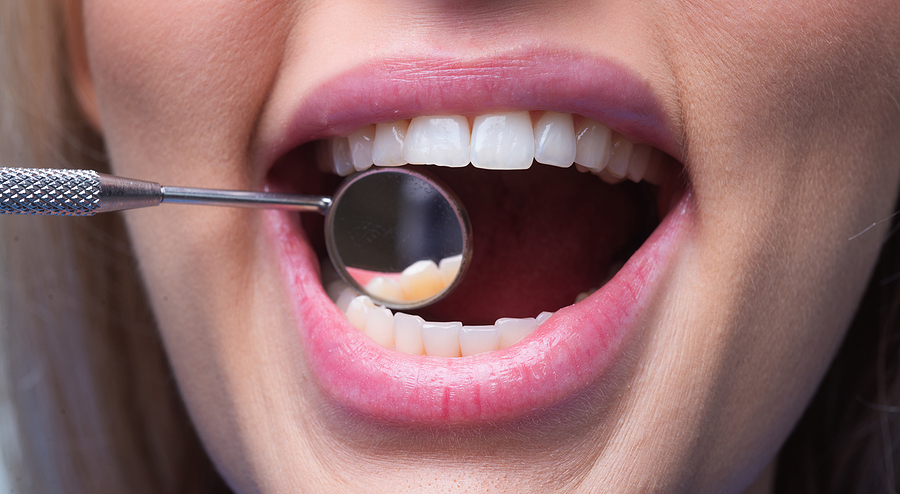Why Do I Need My Teeth Cleaned More Than 2 Times Per Year?
Posted by Complete Dental Health on Dec 16 2020, 12:27 AM

Periodontal gum disease is a common problem that plagues more than 75 percent of Americans. Current research has shown that dental gums or gingiva is body tissue that can indicate the relative health of the body, especially the heart. The presence of disease in these dental supportive tissues can be a sign of larger problems or issues in the body.
Your family dentist is trained to help diagnose the presence of periodontal disease. One of the easiest methods to monitor the health of your gums is by taking a series of measurements around each tooth (periodontal charting) during your professional dental cleaning appointment. These measurements are taken annually, and the data can be used as a comparative measure to evaluate how effective home care and dental habits are affecting one's teeth. If the gum tissue is healthy, this process is easy and should not be painful. Monitoring this data along with diagnostic dental x-rays (used not only to detect decay but to evaluate possible bone loss) is the most common tool used by a dental professional to evaluate the health of soft and hard dental tissues.
The early signs of periodontal gum disease (gingivitis) can be easily identified by an individual when the person notices his gums are tender and easily bleed when flossing between one's teeth. If dental home care is not improved when this early stage of the disease is noticed, the dental problems will progress and affect the bone around the tooth. Different stages for periodontal disease exist and include an escalating scale from gingivitis (slight periodontal disease) to moderate and severe periodontal disease. It is not uncommon to have localized areas in the mouth with periodontal problems, while the "general" health of the gum tissue is not too problematic. When isolated moderate periodontal disease areas are diagnosed, there becomes an increased concern regarding the type of bacteria that are present in the periodontal "pockets" that are facilitating the problem. Removing deposits of calculus along with disrupting the bacterial flora environment surrounding the tooth is typically the first step in periodontal treatment.
When treatment for periodontal disease is indicated, the first non-surgical approach would be to perform a root scaling of the problematic teeth. Many different indicators (periodontal probings, calculus buildup around the tooth root, bleeding, and x-rays) may be used to identify which teeth need gum treatment. Multiple dental appointments may be necessary to complete the recommended treatment. Once the treatment has been completed, more frequent dental cleanings (referred to as periodontal maintenance cleanings) are necessary to evaluate and to maintain the therapy that was rendered.
Periodontal maintenance cleanings are specific so that the dental clinician is allowed to use the clinical time to help maintain the therapy that was rendered during active treatment. Periodontal disease is multi-faceted because many factors (personal diet, sleep, body chemistry, and general health) affect how long the non-surgical root scaling procedure is effective in controlling the disease. The difficulty with periodontal disease is that it can be controlled but not cured. Consistent, frequent periodontal maintenance cleanings are the best option to maintain the healthiest gum tissue. If the gum tissue is maintained to become as healthy as possible, the supporting tissues (crown and roots of the tooth) will also be maintained. Because the most effective method to control periodontal disease is the need for more frequent dental periodontal maintenance cleanings, one's dental clinician will recommend the most proven method to help maintain the health of one's teeth and gums. As consistent, frequent care is rendered, the patient should notice that not only will the result be a healthier, more attractive smile, but the benefits will extend toward improving one's overall general health.
Share On

Why Regular Cleanings Aren’t Enough If You Have Gum Disease
Gum disease is more than just a dental inconvenience; it’s a serious condition that can affect your overall …

How Cosmetic Dentistry Can Improve More Than Just Your Smile
A radiant smile can do wonders, transforming not only your appearance but also how you feel about yourself. …

How Dental Implants Help Restore Proper Chewing and Speech
Are you struggling with chewing or finding it difficult to articulate your words clearly? If so, you're not …

Do Dental Implants Feel Like Real Teeth? What You Need to Know
Are you considering dental implants in Albany, OR? If so, you're not alone. Many people are turning to …

The Impact of Dental Implants on Jawbone Health & Facial Structure
Are you looking for a solution to missing teeth that goes beyond mere aesthetics? Dental implants might be …